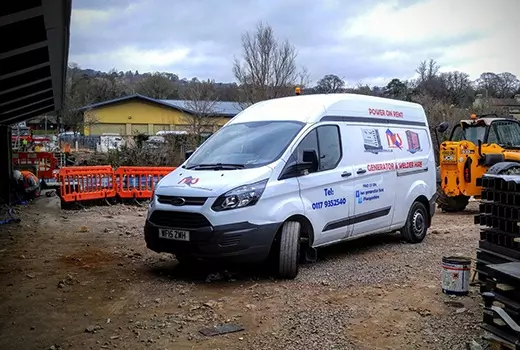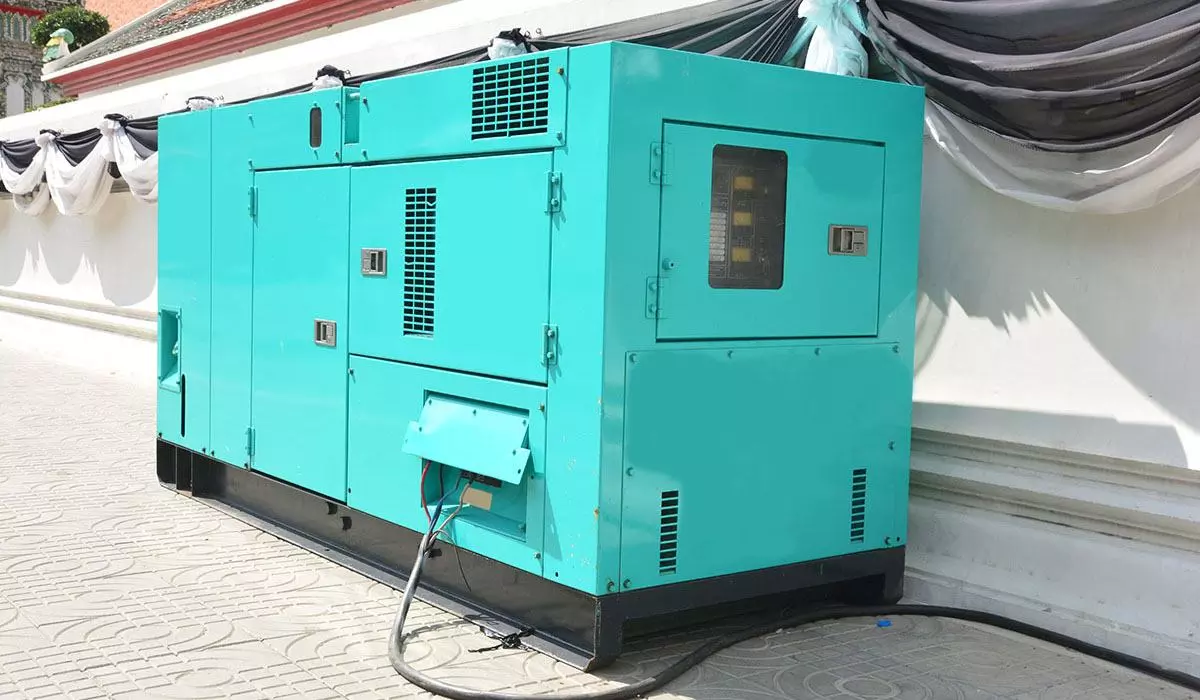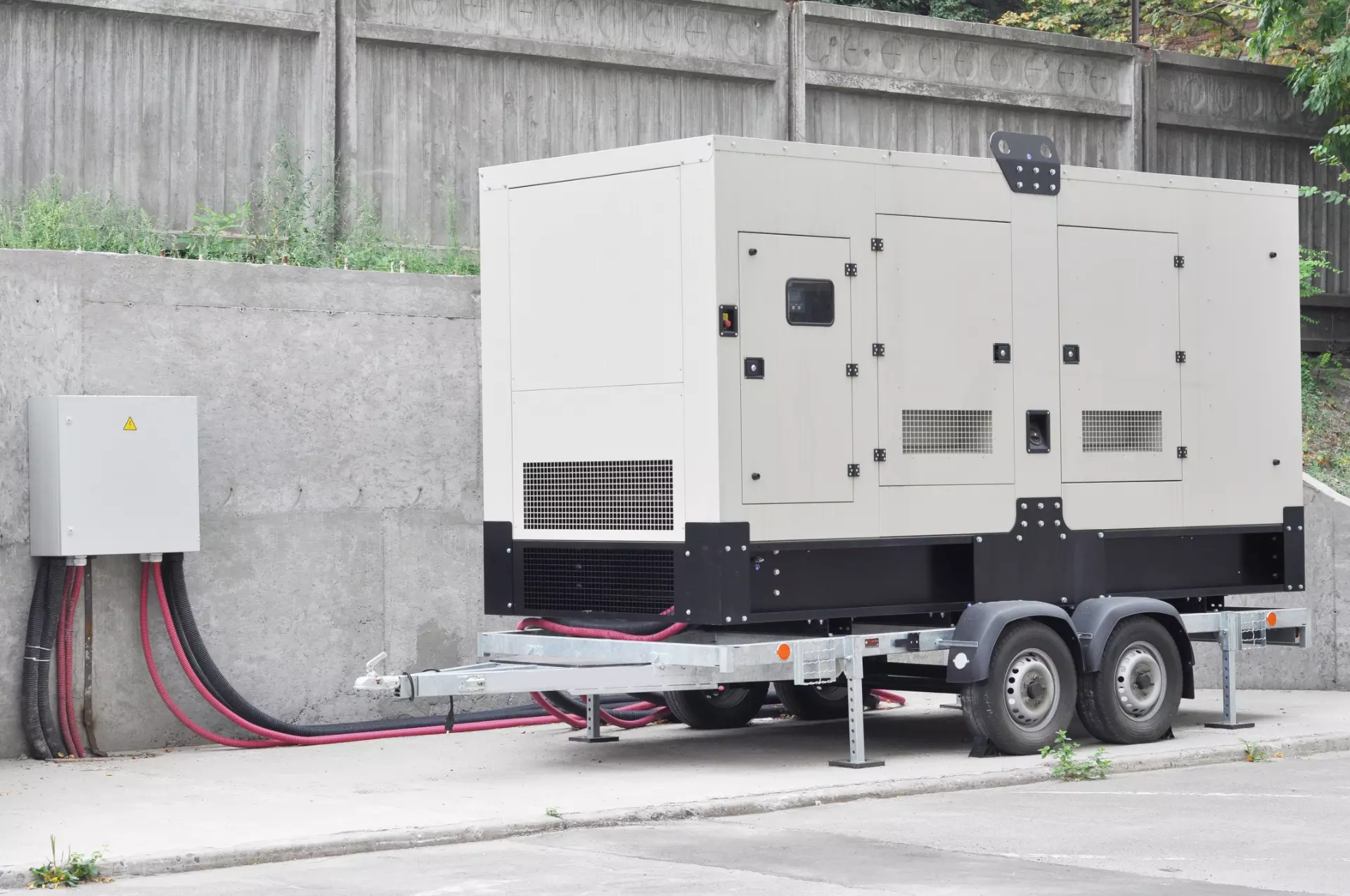What is the difference between a regular generator and an inverter generator? We look at the benefits of each type of generator to find the right one for you.
Do I Need A Conventional or Inverter Generator?
To best understand what type of generator is best for you, you should familiarise yourself with the options. Generators are versatile and ideal for powering anything from a small property, an outdoor event and entire industrial facilities.
They do this by converting chemical or mechanical energy into electrical energy and then supply power to the needed equipment. When you have a power outage, you will need to rely on a generator in those moments that the mains grid isn't available to you.
This can make the difference between losing business and continuing during a power cut or hosting your event off the grid with peace of mind that your guests will continue to receive lighting and heat.
You have the choice of hiring a conventional generator or an inverter, but they both have similarities. While a generator produces electrical power regardless of the design, you can begin to realise there are more options than you originally thought.
This article will explain the differences between both models and break down which is the best generator for you to hire for your domestic or commercial use.

What Is Considered a Conventional Portable Generator?
Conventional generators are designed to run on petrol, diesel or propane fuel and use an internal combustion unit to generate electricity, directed into the electrical current required. A conventional generator also uses a mechanical alternator to produce AC electricity (alternating current).
While many generators are given the term 'portable generator', there are some differences to make a note of. While most conventional portable generators run on fossil fuel, either diesel, propane or gasoline, an increasing number of hybrid models are being created.
This allows the engine to run on multiple types of fuel, giving the user an easier experience and the ability to choose between gasoline and propane.
A fundamental feature of a conventional portable generator is the fixed speed of the engine and corresponding electrical output, as they are designed to run 3600 rpm and generate 120 volts.
The frequency of a conventional portable generator is approximately 60 Hertz. You will experience greater power availability and distribution than that of a wind turbine or solar panels with traditional generators, as you are not relying on the weather.
Main Differences Between an Inverter Generator and Conventional Portable Generator?
While there are similarities, an inverter generator is different than a conventional generator. Both types use an alternator to produce an AC frequency current, but an inverter converts this into a Direct Current (DC).
This is finally inverted into cleaner AC power by a microprocessor, and this entire process produces higher quality and more reliable power comparable to the main grid.
Most inverter generators still work on fossil fuels but have more inner workings. When they draw power from the fuel tank, a battery, alternator, and inverter are all working on completing the process.
The output remains at 120 volts at 60 Hertz, but the quality of the electrical current is much better due to the additional steps. If you have ever heard the phrase 'clean electricity, an inverter generator is responsible for creating it.
The less harmonic distortion caused to produce electricity allows the inverter generator to create higher quality power. Due to this, the energy source generated by an inverter unit is generally considered safer to use for more sensitive electrical devices, such as phones and laptops.
The main difference between the two is that an inverter generator can control its voltage and has greater control over the electrical output, adjusting to what is needed while still maintaining the 3600 rpm. Conventional generators can be noisy while in use, whereas an inverter generator is much quieter due to its stable current.
Inverter generators are typically smaller and more efficient overall, costing you less fuel. The fuel tank is also smaller on an inverter generator, but due to this, the overall quantity of power output is less.
Conventional generators require more space as they are larger and the fuel tank is bigger, so they need more protection. Inverter generators are a more portable device and can even be carried by hand in some cases, whereas conventional models can weigh 45KG and higher.

Despite all of this, conventional generators will prove cheaper than inverters and provide a lot more power to a larger area. Inverter generators work on modern technology, and while they are quieter, more fuel-efficient and create higher-quality electricity, they are costly to produce.
Which is the right type of generator for me?
Now you understand the difference between a conventional generator and an inverter generator, it's time to discuss which is right for you. They are both ideal for specific jobs, and it's understanding those jobs that will aid your decision. Some are more mobile and quieter, provide more power or create better quality electricity.
Here are some factors for you to consider before purchasing or hiring your first generator.
Noise
Most conventional generators are louder than an inverter, but they can be fitted with a soundproof case to help alleviate some of that.
This, of course, further reduces the generator's already limited mobility. Overall, inverter generators are quieter and sleeker, ideal for locations inside where you would notice more noise than outside.

Mobility
All generator forms are available in portable models, alongside the traditional permanent or fixed power source options. Depending on how you need to access the power and your location requirements, you may find a portable option more suitable, or a larger unit could be installed as a backup generator for your facility or office building.
If you choose more portable, inverter generators are generally the best choice, as they are already smaller and more lightweight to manoeuvre. Conventional generators are much clunkier machines and will not be as accessible to move around.
There is also the option of a skid-mounted generator, which is permanently mounted within a metallic frame. This frame is hoisted onto wheels/rails and gives you the freedom to move it around some more.
Electrical Power Quality
Inverter generators produce power of a higher quality than a conventional model and will cause fewer malfunctions or damage to sensitive equipment such as mobile phones.
When using a conventional generator, your electronic devices can sometimes experience malfunctions due to the constant stream of electrical power with no adjustment features.
Not only is the quality of electricity better when an inverter produces it, but the electrical power distribution has more control as it adapts to the power required. This stored power allows the generator to produce AC power for greater periods to your devices.
Amount Of Power
The answer to this query all comes down to what you're planning on powering and for how long.
If you are hosting a small domestic event at your home and need heating and lighting powered for 6-8 hours, you will need a much smaller unit than one that has to be relied on to power an entire facility for days.
On the market, you can purchase portable models capable of powering 650watts to larger units that will produce thousands more for hours on end.
You must tally up all your electronic devices for their recommended wattage and ensure that your purchase is suitable for your power requirements.
Efficiency
With newer models being created every year, it's hard to provide a definitive answer to the most efficient generator.
Inverter generators are stocked with a microprocessor that allows them to run at variable speeds depending on the power demand, giving them greater efficiency and quieter noise in those moments.
Overall you will notice that inverters are greater at fuel efficiency, but conventional generators will be able to power larger areas for longer but will still consume more fuel.
Conventional generators work at their most efficient when high power demand and supply is needed for your location.
Inverter Generators Vs Conventional Generator ~ Which Is The Best?
Hopefully, you've begun to paint a picture in your mind of what generator is best for you, as it all depends on your requirements. Whether you are looking for a one-off hire for your event or you need something longer term that you can rely on in the case of a power cut. Either way, each unique situation will call for different generator engine types.
Inverters are innovative in their design, with their conversion process working in three phases to convert DC electricity into AC clean power and give a greater performance overall.
They adjust to their surroundings and the power demand, giving you greater energy efficiency and control over the fuel source and consumption. A standby generator only kicks in during a power cut, meaning that when the main grid is restored, auto shut features prevent it from continuing to run and save you money.
Standard generators work at a consistent speed, giving you a constant flow of power throughout your event. They are noisier and consume more fuel because of this, as you cannot control the power output of a conventional generator.
A regular portable generator may cope better during power surges but requires maintenance. Many inverter generators can provide sometimes less or no maintenance during running, other than topping up the fuel when it is low.
Periodic maintenance of both a conventional generator and inverter unit is recommended, however, and you will find yourself performing an oil change even on larger engines. You should begin to think about your location size, how much power you need, for how long, your availability of more fuel, fuel type, do you want it portable, and your long-term generator hire options.

Your home supply of fuel may not be enough for longer-term events, and buying as much fuel as possible is expensive and can lead to wastage. Buying from external sources can be cheaper on request.
Accommodating for sudden power spikes during your event when booting up electrical appliances will also take you a long way to making a wise decision.
Even household appliances can cause a surge in power when being used all at once, which is why you should accommodate for this surge wattage. You need enough power to last for your event or location, even if you're using your generator for household use. Once you have decided all of that, you are well on your way to finding the right generator for you.
Generators For Sale
If you are looking to stay as prepared as possible when it comes to powering your events, call us today on 01172 541069 for help choosing the right generator for you.
Now you know the requirements for common appliances you might be using at your events, get in contact to find the right generator for you.
Alternatively, see our range of generators here;





